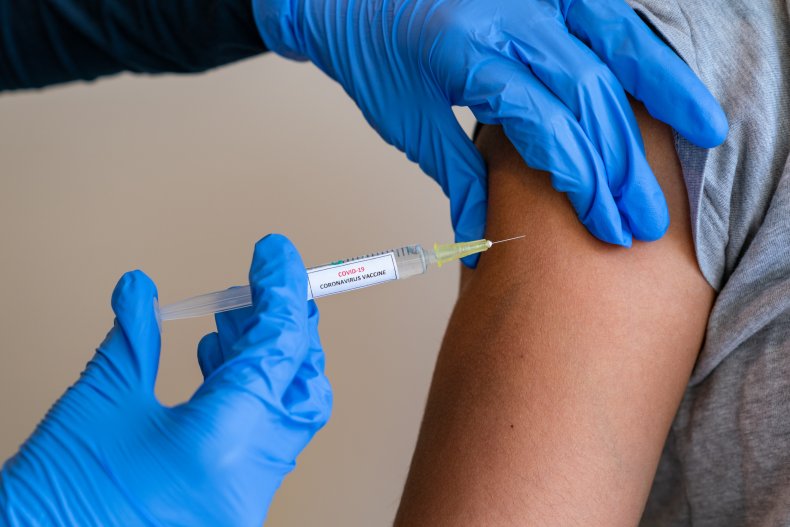An Ohio man has been hospitalized with COVID despite being fully vaccinated. But experts say such breakthrough cases of the disease are still rare.
Brendon Hrepic, 31, received his second shot of the Pfizer vaccine on April 19. Hrepic started to get COVID symptoms on May 12, including a persistent cough and the loss of his sense of taste and smell. He has since been hospitalized with the virus. In footage of Hrepic broadcast by News 5 Cleveland, he was in a hospital bed with a nasal cannula. These are used to give patients oxygen.
Clinical trials of the Pfizer COVID vaccine show it reduces a person’s risk of developing COVID-19 by 95 percent, at least seven days after they have their second shot. The level of protection and length of time needed before it kicks in differs between the various vaccines.
Hrepic told News 5 Cleveland that before he got tested: “I was thinking it was pretty unrealistic because I’m already vaccinated … To be safe, I went to CVS and got a rapid test there and it came back positive.”
Hrepic said: “The doctor that I saw at the ER was like, ‘You are literally the worse case that I’ve ever seen post-vaccination.'”
Hrepic fell sick around the time that Ohio Governor Mike DeWine announced plans to lift almost all COVID restrictions in the state on June 2. Hrepic said he believed this might be premature.
Dr. Claudia Hoyen of University Hospitals in Cleveland told News 5 Cleveland such cases were rare but possible. “Even if you’ve had two vaccines, you may be one of those five in 100 people who didn’t respond to it.”
The U.S Centers for Disease Control and Prevention states on its website that breakthrough cases are to be expected. The CDC says: “COVID-19 vaccines are effective and are a critical tool to bring the pandemic under control. However, no vaccines are 100 percent effective at preventing illness in vaccinated people. There will be a small percentage of fully vaccinated people who still get sick, are hospitalized, or die from COVID-19.”
It goes on: “There is some evidence that vaccination may make illness less severe for those who are vaccinated and still get sick.”
The CDC defines a breakthrough case as a person having the virus or antigens present in swabs taken from their respiratory tract 14 days or more after they have received COVID vaccines authorized by the FDA.
According to the latest CDC data from May 10, of the 115 million-plus people vaccinated against COVID in the U.S., 1,136 patients in breakthrough cases had to be hospitalized and 223 died. Of those hospitalized, 342 were asymptomatic or not related to COVID, and of the deaths, 42 were asymptomatic or not related to COVID-19, the CDC states. As of May 20, over 277,000,000 doses of COVID vaccine have been administered in the U.S.
After an Arizona man became a breakthrough case in April, Dr. Ross Goldberg, immediate past president of the Arizona Medical Association, told ABC 15 Arizona: “No one ever said it [protection] was 100 percent, there’s actually nothing in medicine is 100 percent.”
The patient, Andrew Rascon, tested positive for COVID months after getting his Pfizer vaccine. He told ABC 15 Arizona he lost his sense of taste and smell, got body aches, and a headache, and was soon “feeling things in my body that I had never felt before.”
Goldberg said: “The numbers are small, but obviously when it happens to someone that’s an issue… It’s about mitigating it, and reducing the risk as much as possible.”
Despite his problems, Rascon, who works in health care, said others should get their shots. “Life is so short and unfortunately I have seen some people and friends that have lost their lives to COVID. It just really makes you think and it really makes you just want to live a little bit more,” he said.
Dr. Susan R. Bailey, president of the American Medical Association, told Newsweek: “Each of the COVID-19 vaccines authorized for use in the United States have undergone rigorous, transparent development, testing and authorization, and all three vaccines are highly effective at preventing severe illness, hospitalization and death from COVID-19. Vaccinations against the virus that causes COVID-19 have helped flatten the curve of new cases, offering a clear path toward normalcy.
“For your health, for your loved ones, and for your community, I urge you to get vaccinated. If you or people you love have questions about vaccines, I urge you to talk to your physician. The consensus of public health and medical professionals confirms that vaccines are the best way to defeat this virus—with benefits far outweighing the risk for most people.”
Update 5/21/2021 12: 20 p.m. ET: This article was updated with comments from Dr. Susan R. Bailey.
Correction 5/21/2021 11: 10 a.m. ET: This article was updated to correct the title of Dr. Ross Goldberg to immediate past president of the Arizona Medical Association.
Newsweek, in partnership with NewsGuard, is dedicated to providing accurate and verifiable vaccine and health information. With NewsGuard’s HealthGuard browser extension, users can verify if a website is a trustworthy source of health information. Visit the Newsweek VaxFacts website to learn more and to download the HealthGuard browser extension.

Chaz Bharj /Getty Images
No comments:
Post a Comment